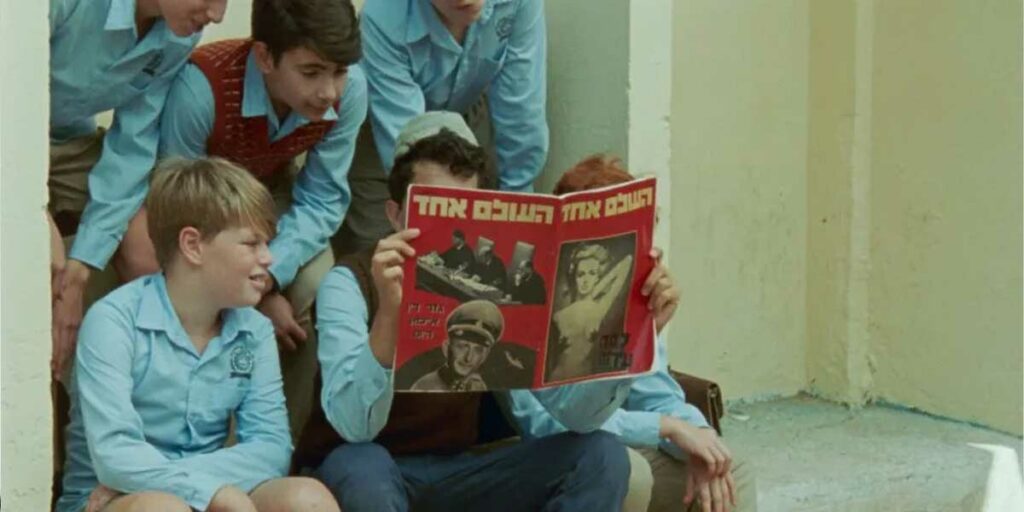June Zero sets out to explore Adolf Eichmann’s trial on screen in a film that balances historical events and personal accounts.
Director: Jake Paltrow
Genre: Historical, Courtroom
Run Time: 105′
US Release: June 28-July 5, 2024 (limited)
UK Release: TBA
Where to watch: in select US theaters
June Zero is an ambitious film, one that wants to depict a significant moment in our recent history through a personal account or, rather, a series of personal accounts from the various characters on screen, contrary to much of the other media coverage on the event which focused mainly on the figure of Adolf Eichmann himself. A lot has been said and written about Eichmann’s trial and his involvement in the Holocaust as one of its major perpetrators.
Most notably, Hannah Arendt wrote the book “Eichmann in Jerusalem: A Report on the Banality of Evil” as a commentary on this very trial and Eichmann’s testimony but June Zero seems to take a different approach in its retelling of history.
June Zero opens in Israel in 1961 with 13-year-old David (Noam Ovadia), a Jewish Libyan immigrant who, at the beginning of the film, starts working in a factory specialized in building industrial ovens. David’s life soon becomes intertwined with one of the most significant events of the post-war period: the trial and subsequent execution of Adolf Eichmann (Alon Margalit), one of the major organisers of the Holocaust. As history unfolds right before our eyes, much of the story is told through two other characters: Haim (Yoav Levi), a scrupulous prison guard, and Micha (Tom Hagy), an investigator during Eichmann’s trial who has lived the horrors of the Holocaust on its own skin.
The actual portrayal of Eichmann as a character that is hardly shown or allowed to speak is one of the most interesting aspects of this film. The audience never sees Eichmann’s face, as he is often framed from the waist down or from the back. He is also never filmed in close-ups, which stands in stark contrast with Micha, whose personal account of the Holocaust is given time in the film and proximity to the viewers through close-ups, thus suggesting an emotional level from which the cold and detached long shots of Eichmann stay away. June Zero makes a lot of powerful choices over what is shown and what isn’t, perfectly understanding its responsibility in portraying such historical events and figures through a visual fictional medium.

June Zero also sparks a fascinating debate about memory as it grapples with the direct aftermath of the Holocaust and questions who the responsibility of its memory rests upon: where is the line between dark tourism and remembrance? The film analyses this in one of the most poignant scenes where Misha reflects on the importance of first-hand testimony of the Holocaust. But the movie also reminds us that not everything is worth remembering. “June Zero. There is no date to commemorate the execution,” says one of the characters at the end of June Zero, explaining that this expression was coined by a local newspaper in order to avoid the possibility of Eichmann’s execution becoming a significant date in the public imagination.
However, while the film was conceptually fascinating, its pacing feels off throughout its whole runtime. June Zero’s biggest issue is choosing David as a protagonist who acts as our eyes and ears in the narration of this historic event: the movie begins and ends with him. And he is a compelling character, but perhaps not the best one to tell the story of Eichmann’s trial, despite his involvement, when characters like Misha and Haim provide such a strong commentary on the events as they unfold. Throughout the film, I felt like I was watching two separate movies cut together, one telling David’s story, and the other one focusing on the historical events through Misha and Haim’s eyes.
While it is undoubtedly narratively flawed, June Zero is a fascinating film for the questions and issues it evokes, and the way Jake Paltrow decides to deal with them on screen. But in a year like this one when we have seen multiple films centred on the Holocaust, of which The Zone of Interest is only one of many examples, June Zero is not nearly as unforgettable as other titles. The historical memory of such tragic events is, however, incredibly important to commemorate, as the last scene of the film proves, and this film does add to the collective memory of the Holocaust and its aftermath, thus making it an interesting film nonetheless.
June Zero will be released in New York theaters on June 28, 2024 and in LA on July 5, with additional screenings in select US theaters to follow (see list on the Cohen Media Group site).

